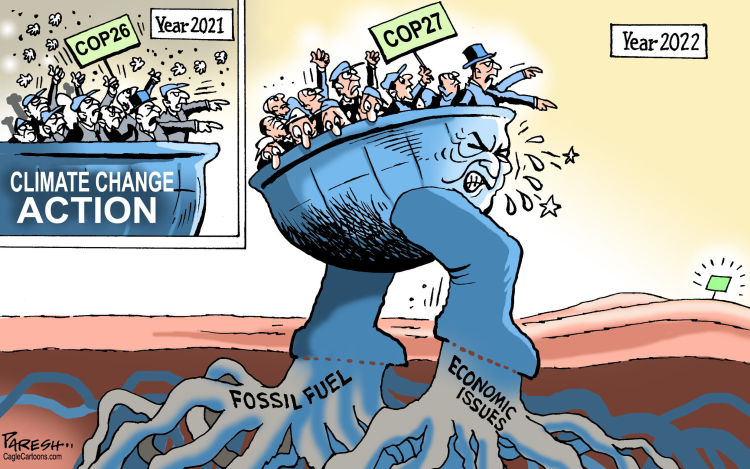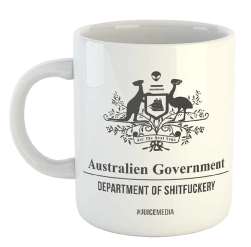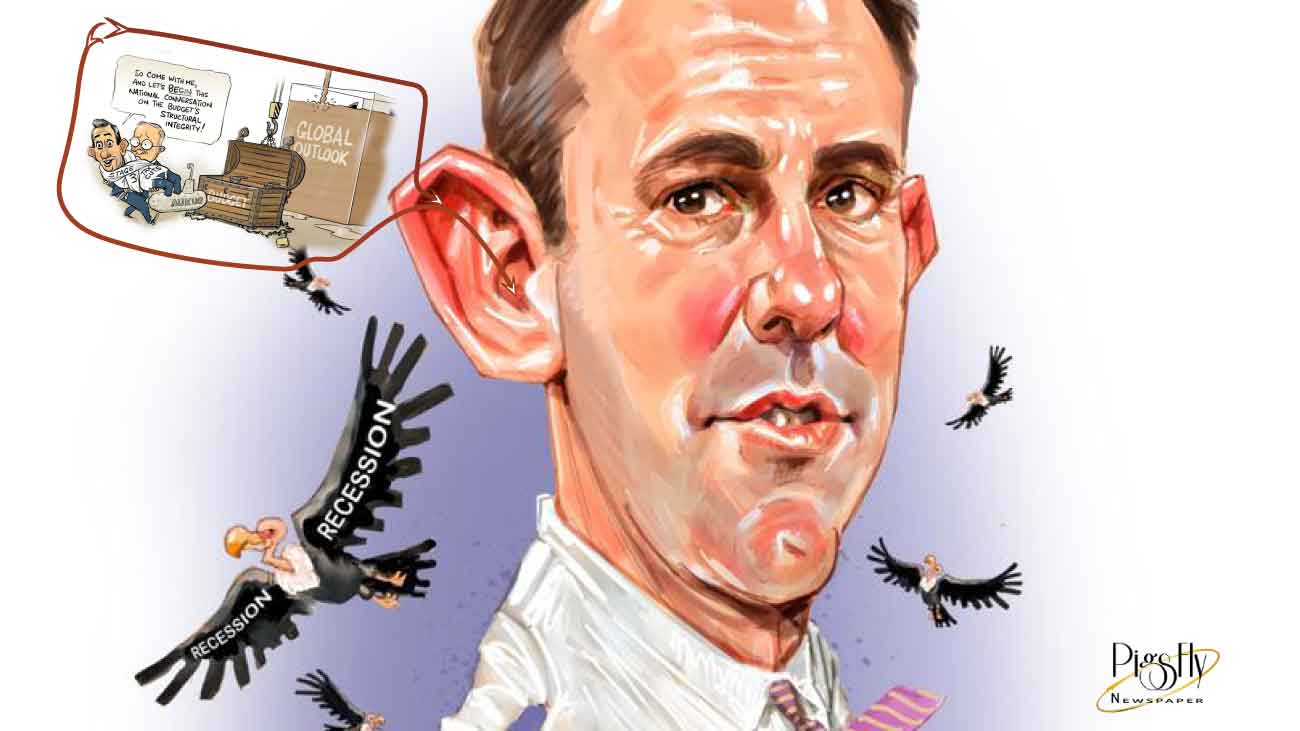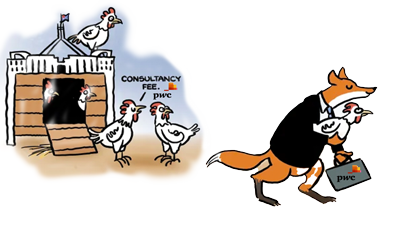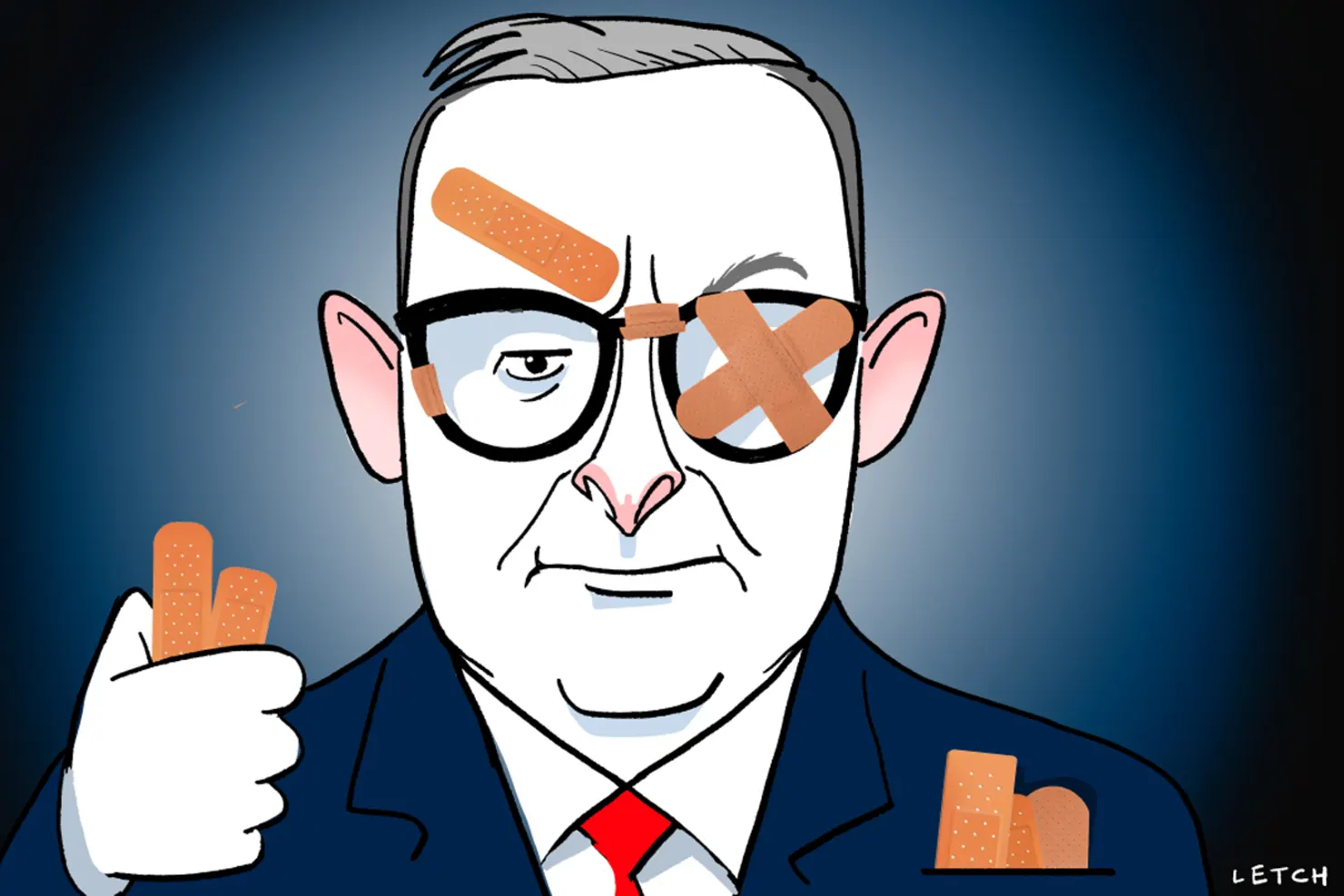Qantas considers paying back JobKeeper
As the national carrier faces increasing criticism of its conduct, a former minister likens the airline’s management to ‘terrorists’.
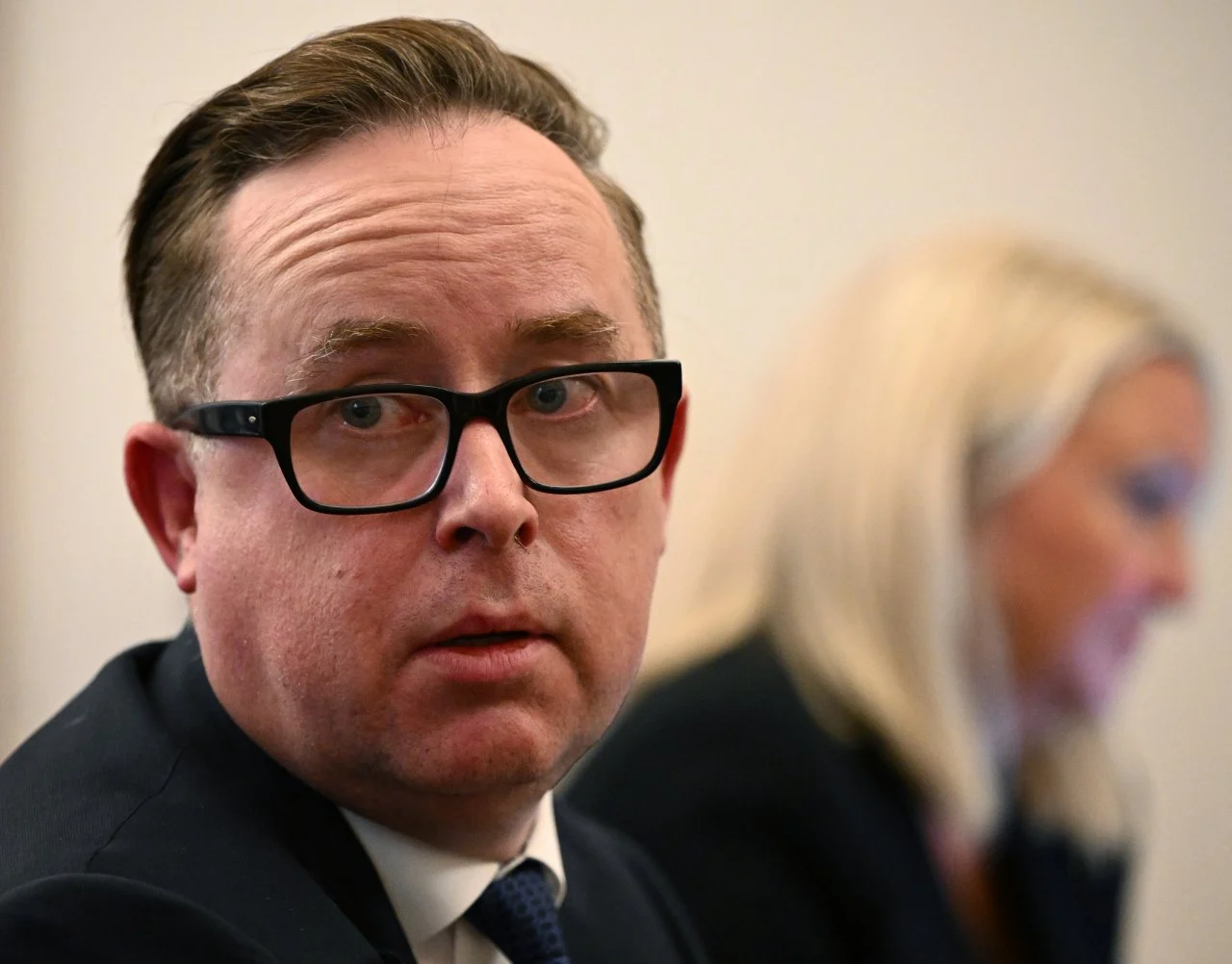
Qantas directors have discussed whether the airline should pay back some of the almost $900 million the company claimed in JobKeeper benefits during the pandemic, as a circuit-breaker to stabilise the collapse in its reputation.
Both the board and Qantas’s outgoing chief executive, Alan Joyce, have previously taken a hard line against calls for the airline to refund any of the Covid-19 assistance funds. Last week, Joyce even implied paying back JobKeeper would have to come directly from his employees.
“Should our people who got the money for JobKeeper pay that back? And you’d say no,” he told 7.30 host Sarah Ferguson. “All of that money went for particular reasons.”
The reconsidering of that position comes after a fortnight of bad press, including allegations the national carrier – which has posted a record pre-tax profit for the year of $2.47 billion – pressured the Albanese government to block extra competition on some international routes, keeping prices up to 40 per cent higher than necessary. There was also controversy over Prime Minister Anthony Albanese’s son being given access to the airline’s Chairman’s Lounge.
A source with knowledge of the Qantas deliberations told The Saturday Paper the board was contemplating whether it was worth paying back some government assistance it received during the worst of the Covid-19 pandemic, as both a goodwill gesture and distraction from its other woes. No decision has been made.
“They’re fucking terrorists,” a former senior minister told The Saturday Paper. “And they will do whatever it takes in their own interests and only in their own interests.”
Former transport minister Barnaby Joyce was just as forthright, telling The Saturday Paper the $2 billion in government assistance was a loan.
“I think, as a former transport minister, Alan, the money that supported Qantas was not my money nor the treasurer’s money,” he said.
“It was the Australian taxpayers’ money. And to be quite frank, it was borrowed [from] the Australian taxpayer and will have to be repaid back to the Australian taxpayer.”
The Member for New England, who was in government when the money was paid, also accused Alan Joyce of having benefited personally from the arrangement.
“Now, directly or indirectly, Mr Joyce, you are a pecuniary beneficiary from that,” Barnaby Joyce said.
“And I think you really have to ask yourself the question, ‘Should some of the money that the taxpayer has given us be given back?’ ”
After months of backroom wrangling, Alan Joyce gave evidence to a parliamentary inquiry into the cost of living on Monday, where he attempted to argue otherwise when grilled about his bonuses.
“You deferred your 2020, 2021 and 2022 long-term bonus shares again. Are you going to do that this month, or have you chosen to accept these shares?” Nationals Senator Bridget McKenzie asked.
Joyce confirmed he had now chosen to accept those shares because Qantas was “back in profits” and he was leaving in November.
McKenzie argued that Joyce was effectively collecting his bonuses whether or not the company did well.
“You actually set aside your bonuses so you can take them later,” she said. “So Qantas can make a $6.3 billion loss and you, at some later date, can actually collect, you know, $6 million in bonuses. It’s a very cosy arrangement that you’ve set up for yourself.”
Joyce argued McKenzie was “misunderstanding” the different categories but agreed his decision to cash out shares was his alone, not voted on by the board or shareholders.
“Meanwhile,” McKenzie said, “Australians can’t find their bags, we’ve got cancellations and delays particularly in and out of Sydney, that are all, I would suggest to you … very premeditated.”
McKenzie was alluding to a belief inside the aviation industry that Qantas was hoarding its “slots” at busy airports by cancelling flights to prevent competitors getting a foothold. In essence, cancelling flights allows the airline to hold on to its allocation of hourly flight movements without allowing other carriers to pick up the spare capacity. Qantas vehemently denies this.
Another parliamentary inquiry, this one into economic dynamism, competition and business formation, heard evidence last week that noted suspiciously high flight cancellation rates on specific routes, over and above what might have been caused by weather or air traffic control issues.
“One of the more significant factors contributing to competition issues includes overfilling and slot hoarding, a process whereby incumbent airlines file for more slots than they need and then regularly cancel flights,” Sydney Airport Corporation executive general manager aviation Rob Wood told senators.
“Through the 2010s, and as slots during Sydney Airport’s peak hours started to fill, we noticed a trend in the incumbent airlines increasing slot filings. It appeared as though an arms race of sorts was taking place, even though overall patronage was not increasing at the same rate.
“The trend continues in the post-pandemic environment and cancellation rates on certain routes remain high, bringing into question why airlines apply for and hold slots they seemingly don’t need.”
At his hearing, Joyce, who has been Qantas’s chief executive since 2008, came armed with some “suggestions” for the committee.
“First, we need to get the regulations around airport infrastructure right. Australia’s monopoly airports are some of the most profitable in the world,” he said.
“And, ultimately, it’s the passenger who’s paying for that. To put this in perspective, our profit margin this year was 13 per cent. Before it was brought down, Sydney airport’s profit margin was around 40 per cent. That’s an extraordinary return.
“A major cost pressure for the Qantas Group moving forward is increased airport pricing.”
The Qantas boss was a key proponent of a second Sydney airport at least as far back as 2012, when he wrote an opinion piece in The Daily Telegraph asserting the country “cannot afford to wait much longer to make a decision”.
Anthony Albanese, then minister for infrastructure and transport, was a key backer of the proposition. Then Sydney Airport Corporation chairman Max Moore-Wilton was not enthused, naturally, and when he announced his resignation Albanese famously put out a one-word press release in response: “Good.”
In June, Qantas and Jetstar became the first carriers to sign on to operate flights at the new Western Sydney International Airport when it opens late in 2026. On the day of the announcement, Qantas executives toured the precinct with Albanese and Transport Minister Catherine King.
Joyce has a knack for getting what he wants, especially from governments. In 2011, he grounded the entire Qantas fleet, domestically and overseas, to end a union dispute. He did not forewarn the government, key members of which were stranded in Perth at a Commonwealth Heads of Government Meeting.
“With Alan Joyce, it has always been the carrot and the stick,” a source who has dealt with him says.
“When he shut down the airline during CHOGM you thought, This guy will fucking do anything. And then there’s the carrot. It’s easier to accept the carrot because you know he’ll try and apply the stick.”
In July, Catherine King rejected a bid by Qatar Airways for an extra 28 flights each week into Australia based on “the national interest”. Qatar has a strategic partnership with key Qantas rival Virgin Australia, which is currently up for sale.
King’s colleague, assistant treasurer Stephen Jones, appeared to give the game away when he told The Australian Financial Review that allowing more access to Qatar might drive down international fare prices, with the risk of making business “unsustainable for the existing Australian-based carrier”.
When asked if she backed Jones’s comments, King said: “I wouldn’t have
used the same words that Stephen did.”
Speaking at a press conference on Tuesday, Albanese defended the decision in almost exactly the same words Alan Joyce used the day before. “Qatar can fly into Adelaide, as many planes as they like, as big as they like. They can fly in other planes, which are bigger planes, that bring in more people,” Albanese said. “There is nothing unusual about a nation state not having access to unlimited flights wherever they like to go, whenever they like to go.”
Former national secretary of the Transport Workers’ Union and now Labor Senator Tony Sheldon was the one who fought to have Joyce brought before the cost of living inquiry. The senator managed to extract from Qantas executives the admission that they were holding on to more than $500 million in Covid-19 “flight credits”, which were due to expire at the end of this year. If the credits were not claimed, Qantas stood to book the remainder as a contribution to its profit.
On Thursday, news leaked that the airline had reportedly made a decision not to enforce the expiry date.
Joyce told the hearing Qantas was trying everything it could to get the money refunded. That is not the experience of customers who have tried, in vain, to get refunds or flight credits equivalent to what they paid.
“There’s no other way to describe it as anything other than offensive,” Sheldon tells The Saturday Paper. “They are literally holding the Australian public to ransom and stealing. We used to call that highway robbery.”
Sheldon has dealt personally with Joyce and his senior managers over many years. He simply does not trust them.
“I’ve never found in a conversation with Qantas, its senior management, where they have given an undertaking that they haven’t then broken,” he said.
“They’ve either done it intentionally with forethought or unintentionally with no consideration for the consequences.”
Former transport minister John Sharp, now the deputy chairman of Rex Airlines, told the inquiry into economic dynamism that Qantas did not add flights to some regional routes until Rex attempted to expand into them. He said the carrier then poached Rex Airlines captains and pilots to staff the routes.
Sharp and his then department secretary, Peter Harris, designed the slot system used by airports and the comfortable leeway of 20 per cent for cancelled flights. Harris conducted an independent review of that demand management system for the Coalition in February 2021. Nothing has been done with it.
“Clearly, it’s not in the interests of some airline operators to have any changes because, at the moment, some airline operators have a significant advantage from the existing system that gives them a very dominant position in the airline market through a government-regulated slot system,” Sharp told the inquiry.
“So any change would be resisted by them, and I wonder how they’ve managed to influence the outcomes here by leaving the Harris report sitting on a shelf, gathering dust for two-and-a-half years.”
On Thursday, the Australian Competition and Consumer Commission launched action in the Federal Court of Australia alleging Qantas between May and July in 2022 kept selling tickets online for 8000 flights it had already cancelled and did so for an average of two weeks after the flights were axed.
In that period, Qantas cancelled 15,000 out of 66,000 scheduled flights across the country and overseas.
“We allege that Qantas made many of these cancellations for reasons that were within its control, such as network optimisation including in response to shifts in consumer demand, route withdrawals or retention of take-off and landing slots at certain airports,” the commission’s chair, Gina Cass-Gottlieb, said in a statement.
She noted cancelled flights “can result in significant financial, logistical and emotional impacts for consumers”.
In its own statement, Qantas said the cancellations happened at “a time of unprecedented upheaval” for the industry. “We have a longstanding approach to managing cancellations for flights, with a focus on providing customers with rebooking options or refunds,” it said. “It’s a process that is consistent with common practice at many other airlines.”
If found to have broken consumer law, Qantas could be fined 10 per cent of its annual turnover per breach. As Joyce prepares to step down after 15 years at the top, the airline’s reputation has never needed as much maintenance as it does now.
This article by Rick Morton was first published in the print edition of The Saturday Paper on September 2, 2023 as “Exclusive: Qantas considers paying back JobKeeper”.


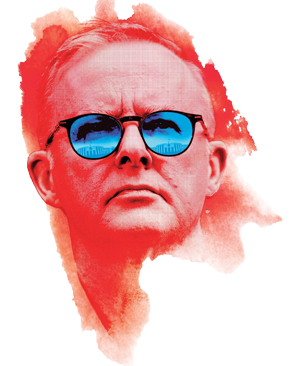 PM Anthony Albanese gifts Chairmans Lounge access to his son. WTF. Then Anthony Albanese arranged a work placement at PwC for his son while vehemently declaring his son is a private person and should not be put under the spotlight by the media. WTF twice.
PM Anthony Albanese gifts Chairmans Lounge access to his son. WTF. Then Anthony Albanese arranged a work placement at PwC for his son while vehemently declaring his son is a private person and should not be put under the spotlight by the media. WTF twice.